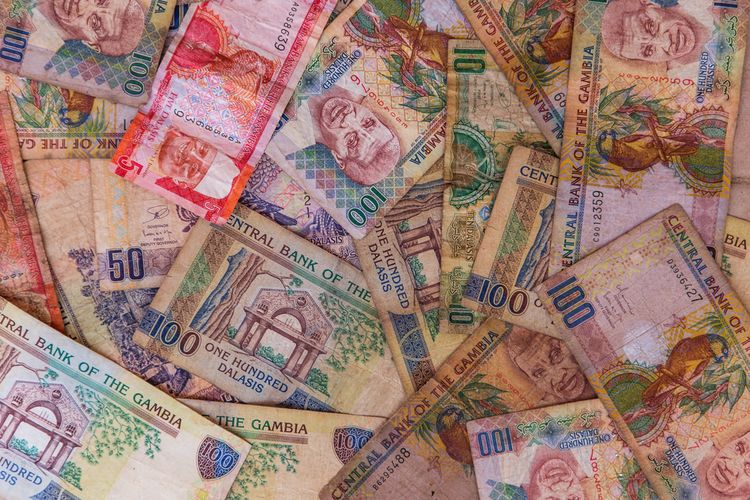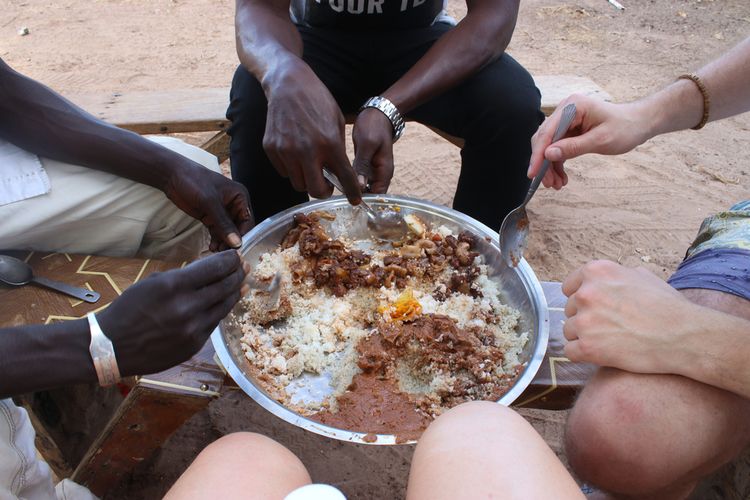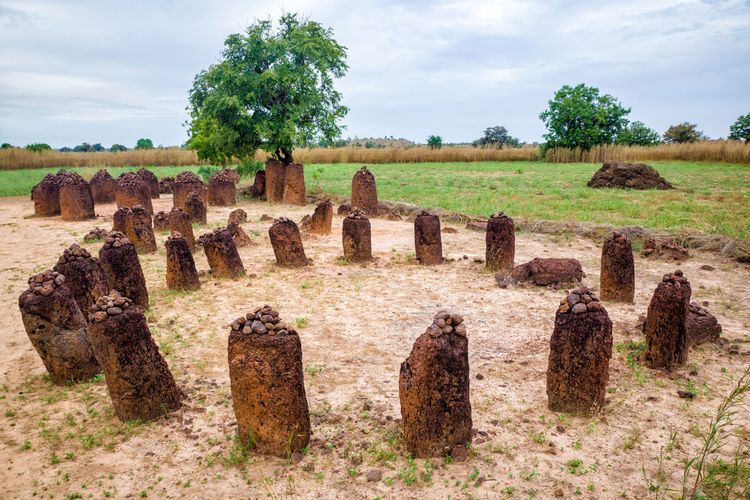Gambia Travel Tips and Information
Official Name
Republic of The Gambia
Capital
Banjul
Population
Country Code
Approximately 2.7 million
GM
Country Code (international calls)
+220
The flight time to Gambia is approximately ---- hours. Check the climate, currency, religion, manners, other information of Gambia below. Wishing you pleasant travels to Gambia.
The Gambia is a country located in West Africa. Its long, narrow shape stretching east to west resulted from European settlers living along the river, which later became the basis for the country’s borders. The Gambia is entirely surrounded by Senegal.
Local Climate / Weather
The Gambia, located on the West African coast, has a tropical climate with distinct dry and rainy seasons. The dry season typically runs from November to May, bringing warm temperatures, low humidity, and clear skies – ideal conditions for travelers seeking sunshine and beach activities. During this period, temperatures range from 24°C to 32°C (75°F to 89°F), making it the best time to visit for a comfortable experience exploring nature reserves, coastal towns, and cultural sites. The rainy season, from June to October, sees frequent showers, high humidity, and occasional thunderstorms, particularly in July and August. Although the countryside becomes lush and green, travel can be more challenging due to wet conditions, and some tourist activities may be limited. For those planning a trip to The Gambia, the dry season is the most popular for international tourists, as it allows for more reliable weather and ease of travel. Travelers who prefer fewer crowds and don’t mind occasional rain might enjoy visiting during the early or late rainy season. The lush landscapes during this period also provide a scenic backdrop, especially for nature enthusiasts. Throughout the year, The Gambia hosts several vibrant events and festivals that celebrate its rich heritage and traditions. January brings the renowned International Roots Festival, which celebrates African culture and offers insights into The Gambia’s historical links to the African diaspora. In February, the Banjul Demba Cultural Festival showcases traditional music, dance, and arts, drawing locals and visitors alike. Another significant event is the Tobaski Festival (Eid al-Adha), observed by the Muslim population, featuring communal prayers, family gatherings, and feasts. These festivals provide travelers with unique opportunities to immerse themselves in Gambian culture and traditions, enhancing the travel experience with memorable cultural insights.
Currency & Tipping
Currency
The currency used in The Gambia is the Gambian dalasi (GMD), represented by banknotes in denominations of 5, 10, 20, 25, 50, 100, and 200 dalasis, and coins of 1, 5, 10, 25, and 50 bututs, as well as a 1 dalasi coin. While larger establishments may accept card payments, cash remains the most widely used form of payment, especially for small transactions, markets, and street vendors. Currency exchange is best handled in The Gambia, as it can be challenging to obtain dalasi outside of the country. Exchange services are available at the airport, in banks, and at licensed currency exchange outlets in major towns. ATMs are available but may charge additional fees for foreign cards, so travelers are advised to carry cash and exchange larger amounts at once for convenience and better rates.
Tipping
Tipping is generally appreciated but not obligatory in The Gambia. In restaurants, a 5-10% tip is customary for good service, although some higher-end establishments may add a service charge to the bill. Hotel staff, guides, and taxi drivers may also appreciate a small tip as a gesture of gratitude. For travelers, understanding these tipping customs can enhance interactions with locals and ensure a warm reception.
Useful Travel Information

Voltage & Electrical Outlets
The standard voltage is 230V with a frequency of 50Hz, and the most commonly used plug types are Type G. Travelers with devices designed for a different voltage should consider bringing a voltage converter or adapter to ensure compatibility, especially for sensitive electronics.

Internet Connectivity
Internet access in The Gambia has been improving, but it may still be limited in rural areas. Major hotels and urban areas offer Wi-Fi, though speeds can vary. For reliable connectivity, travelers might consider purchasing a local SIM card with a data plan upon arrival, which provides more consistent internet access, especially for navigating or staying connected during day trips.
Water for Consumption (Drinking Water)
Tap water in The Gambia is generally not recommended for drinking due to differences in treatment standards. Travelers should opt for bottled water, which is widely available, or use filtered water when possible. Drinking bottled water helps avoid potential health issues and ensures a safe and comfortable stay.
Culture, Religion & Social Etiquette
Culture
The Gambia is known for its rich, diverse cultural heritage influenced by various ethnic groups, including the Mandinka, Fula, and Wolof. Traditional music, dance, and storytelling play an essential role in Gambian society, with vibrant cultural performances often featured at local festivals and events. Travelers will find that Gambians are friendly and welcoming, often emphasizing community and family ties, values that resonate with culture.
Religion
Islam is the predominant religion in The Gambia, with around 90% of the population identifying as Muslim, while small Christian and indigenous communities coexist peacefully. Travelers may notice the presence of mosques, the observance of Islamic customs, and the celebration of major Islamic holidays like Eid. Visitors are encouraged to respect local customs, such as dressing modestly near religious sites and avoiding disruptions during prayer times.
Social Etiquette
Gambians are generally polite and respectful, with greetings being an essential part of social interactions. Travelers should make an effort to greet locals with a friendly “Hello” or “Salaam Alaikum” to make a positive impression. It’s also customary to use the right hand for giving or receiving items, as the left hand is considered impolite for these purposes. Gambians value respect and patience, so travelers will likely feel at ease in a society that values good manners and hospitality.
Food Culture
The Gambia’s food culture is a vibrant blend of African flavors and influences from Arab and European cuisines, creating dishes that are both rich and flavorful. A staple in Gambian cuisine is rice, often served with savory sauces, stews, and fresh vegetables. Popular dishes include domoda, a peanut-based stew, and benachin, a rice dish similar to jollof rice, typically enjoyed by locals and travelers alike. Street food in The Gambia offers an affordable and authentic taste of the country, with favorites like fried fish, grilled meat skewers, and akara, a fried bean cake. Travelers exploring Banjul and other cities can find a variety of local restaurants, such as Butcher’s Shop and La Parisienne, offering traditional Gambian dishes alongside international options. Sampling The Gambia’s cuisine offers a unique and flavorful insight into its rich cultural heritage, making it an essential part of any visit.
Major Tourist Attractions & UNESCO World Heritage Sites
Major Tourist Attractions
The Gambia offers a variety of tourist destinations that showcase its stunning landscapes, rich culture, and vibrant wildlife. Banjul, the capital city, is a great starting point, where visitors can explore the bustling Albert Market and experience the lively local culture. The coastal areas, especially Sanyang Beach and Kololi Beach, are popular spots for relaxation and water activities, with soft sands and serene views of the Atlantic Ocean. For nature enthusiasts, the Abuko Nature Reserve and Kiang West National Park are ideal for spotting diverse wildlife, including monkeys, birds, and even the occasional crocodile. Another must-visit is the Gambia River, where visitors can take scenic boat tours and enjoy the country’s unique ecosystem. These destinations offer a wide range of activities that appeal to adventure seekers and leisure travelers alike.
UNESCO World Heritage Sites
One of The Gambia's most significant UNESCO World Heritage Sites is the Kunta Kinteh Island and Related Sites, which hold historical and cultural value tied to the transatlantic slave trade. This site, located on the Gambia River, includes Fort James and remnants of colonial buildings, providing a glimpse into the nation’s complex past. Guided tours here offer valuable insights into West African history, making it an educational experience for visitors. Another heritage site is the Wassu Stone Circles, a collection of ancient stone monuments in the Central River Region believed to be over 1,200 years old. These intriguing stone structures are a source of mystery and offer an opportunity to explore The Gambia’s ancient cultural heritage. Both sites allow travelers to delve into The Gambia’s history and experience its deep-rooted cultural significance.
Travel FAQs
What is the safety situation in The Gambia like? What should travelers be careful of?
The Gambia is generally safe for travelers, but travelers should exercise caution due to petty crimes like pickpocketing and theft, especially in crowded areas and tourist spots. It's advisable to avoid walking alone at night, particularly on beaches, and to be cautious of individuals known as 'bumsters' who may approach tourists for money or favors.
What is the best season to visit Gambia?
The best time to visit Gambia is during the dry season with little rain, from November to May.
What is the most popular airport to fly to Gambia?
Banjul International Airport, located 24km from the capital, Banjul, is popular.
Is English spoken in the Gambia?
English is one of the official languages in Gambia, so you will have no trouble getting around in tourist areas or hotels.




